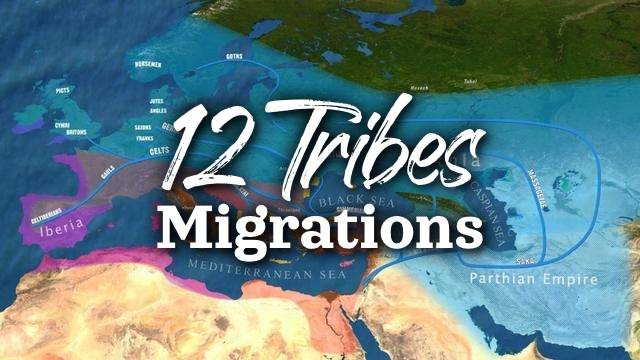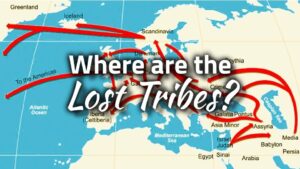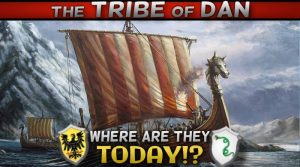Where is the Tribe of Dan Today?
The Untold History of the Tribe of Dan
It is the 20th century BC and Jacob, after having consorted with one of Rachel’s handmaids Bilhah, (and under Rachel’s proxy due to her infertility), Bilhah becomes pregnant and bears for Jacob a fifth son. Rachel takes parentage over the boy, and praising Yahweh God for the blessing she says:
Gen 30:6 “And Rachel said, God hath judged me, and hath also heard my voice, and hath given me a son: therefore called she his name Dan.”
Soon after Dan has one full brother under Bilhah, that being Naphtali. Jacob ultimately has twelve sons under four different wives, with the final two finally being born under Rachel. These twelve sons would go on to become the patriarchs of the twelve tribes of Israel. Their descendants would go on to each have distinct roles in the unfolding of prophecy and history.
There is much to be learned of the tribe of Dan, for they made paths in the wilderness where no other dared to go. Wherever they travelled they left signs of their name, just as a serpent leaves trails as they pass through the sand. They were explorers and warriors, and they were also voyagers of the sea.
This is the history of the tribe of Dan:
The Waymakers
In his old age, Jacob gathers his sons to tell them what is going to befall them in the future:
Gen 49:1 “And Jacob called unto his sons, and said, Gather yourselves together, that I may tell you that which shall befall you in the last days. 2 Gather yourselves together, and hear, ye sons of Jacob; and hearken unto Israel your father.”
The phrase ‘last days’ comes from the Hebrew word achariyth (Strong’s # 319) which means future, so these prophecies are not indicated to have an end-time fulfillment. We will see that they were fulfilled in both the near and far future. When the apostles referred to the Old Testament, they believed that they themselves were living in the ‘last days’ (Hebrews 1:2, 1 John 2:18).
Jacob goes on to bless his sons with precedence, rather than in the chronological ordering of their births. After having blessed multiple of his sons, Jacob then brings Dan forward and blesses him:
“Gen 49:16 Dan shall judge his people, as one of the tribes of Israel. 17 Dan shall be a serpent by the way, an adder in the path, that biteth the horse heels, so that his rider shall fall backward. 18 I have waited for thy salvation, O LORD.”
The Septuagint reads verse 18 better, where it reads as continuing from verse 17:
“waiting for the salvation of the Lord.”
Jacob is repeating a theme here which was first uttered by Rachel at Dan’s birth, when she said that Yahweh had judged her and blessed her upon the birth of Dan. Jacob views Dan to be a judge himself, and interestingly that his descendants would judge themselves. Kings and priests typically judged the people, but the tribe of Dan would have more autonomy, and we see this fulfilled through the reckless independence they sought to carve out for themselves in the time of Joshua. In Hebrew, Dan is translated as “judge” דן, from the verb דין (din), to judge or govern. As Hebrew writing has no vowels, it is written simply as ‘dn’. Variations of the name can be Dan, Den, Din, Don or Dun.
This independence would not always work in the tribe of Dan’s favor. We see in scripture that self-centered objectives for independence often end in disaster, such as when Israel traded Yahweh as their king for an earthly one, and set themselves up for tragedy. It was partly the same for the tribe of Dan, where in the time of the Judges they felt their territory was not sufficient enough for them, so they sought independence northward in the city of Laish.
Beforehand, the tribe of Dan had went into captivity in Egypt along with the other tribes, later following Moses in the Exodus. They were large in number at that time, the second largest of all the tribes, second only to Judah, where two years after the Exodus they had numbered at 62,700 men old enough for war (that being 20 years and older).
Numbers 1:39: “those who were numbered of the tribe of Dan were sixty-two thousand seven hundred.” (NKJV)
In Palestine, they assisted Joshua in the conquest of Canaan. The territory that was allotted to them was on the coast of the Mediterranean and bordered Eastern Manasseh to the north, Ephraim to the northeast, Benjamin to the east, and then Judah to the south.
Shortly before they had entered the land of Canaan, Moses made blessings to the tribes shortly before his death, as he was not going to enter Canaan with them. In this blessing, he said the following regarding the tribe of Dan
:
Deut 33:22 “And of Dan he said, Dan is a lion’s whelp: he shall leap from Bashan.”
This could very well be read as a prophecy; as Dan’s allotment of territory was far south of Bashan. But as we had briefly mentioned earlier, in their pursuit of independence a portion of Danites had travelled northward to conquer Laish. The Danites had felt that their original portion of land was not sufficient, and we read this account in Judges 18; (considering that Dan was the second large tribe, their land allotment could be interpreted as relatively small).
The city of Laish which they conquered and renamed Dan was indeed in the land of Bashan. Renaming territories and lands after their original patriarch was a tradition that would continue on for quite some time; as we’ll see shortly.
From there in Bashan, they fulfilled the words of Moses, having leapt forth as a lion’s whelp towards the Mediterranean, as the Danites were a sea-faring tribe famous for their exploration.
This city of Dan, formerly called Laish or Leshem, was the northernmost extent of the proper cities of Israel in all their tribe’s borders. In contrast, Beersheba represented the southernmost extent of cities. It is from here that we are given the Hebrew phrase “From Dan to Beersheba”, which appears nine times in the Bible. It is interesting to note the city of Dan’s proximity to Tyre, and the fact that the Danites were later connected with the Tyrians as having assisted them in their mercantile pursuits. (Eze 27:19)
In Laish, the Danites had taken on pagan practices. When they had initially sent forth scouts from the south to look for fertile land, the scouts stayed in the home of an idolatrous Levite priest named Micah. When the Danites later sent 600 warriors to conquer the city of Laish, they took also the idol of Micah and set up a priest alongside it.
There was also another instance in scripture where the Danites were specifically connected with an idolatrous affair, as Dan was one of the seats of the idolatry of Jeroboam I. The idolatrous king had set up two golden caves; one in Bethel and one in Dan. 1 This led the people of the land into great sin, and Jeroboam caused great distress in Israel.
This demonstrates one of the serious errors of having a king in Israel, as kings being fallible were capable of leading the nation into sin. Power was also capable of corrupting even apparently honest men, which we see in the case of Saul. Yahweh was supposed to be Israel’s king indefinitely, but the Israelites had demanded an earthly king during a time of tumultuous conflict with the Philistines. Yahweh, through the prophet Samuel, warned Israel that having a king would end in disaster; but they did not listen. It is to our benefit that Yahweh is once again our King, through Christ, who will sit on His throne forever upon the Second Advent.
But in the time of the Judges, there were no kings, and this was the same era as when the Danites had taken Laish. In this time one of the most notable Danite heroes arises, known as Samson. Samson was one of the last judges of Israel before the institution of the monarchy, and he was a great warrior who fought off a lion with his bare hands, and slew over a thousand Philistines with the jawbone of an ass. Being strong in body through the grace of God, he was ultimately felled by the entices of his own flesh: through his apostasy and relationship with a Philistine woman named Delilah. Samson, as a Nazarite, had a vow to keep and he transgressed it through his relationship with Delilah.
In Paul’s epistle to the Hebrews, he counted Samson as a noble hero due to his faith, but that does not mean that he was perfect, as all men sin. Though it is important to note that the sin of Samson with Delilah was not necessarily fornication. The Philistines, as recorded by Moses in Genesis 10:14, were descended from Mizraim, the son of Ham, an early offshoot of the Egyptians and Adamic. In contrast, Esau was called a profane man and fornicator by Paul for his marriage to Hittites, who were not Adamic. Samson was never called such as the Philistines were a religious violation and not a racial one.
Yahweh would often raise heroes as defenders of His people in times that they obeyed His law, Samson and Gideon being two examples, although not all Danites would be as eager to rush to battle as Samson was. Warfare was a consistent problem in Judea at the time, and Yahweh was using several groups to chastise Israel; in part because they had failed to follow the initial command to slay the Canaanites in the time of Joshua. Yahweh had said that because of this, they would be thorns and thistles in their sides, and that He would use them to teach them war. (Judges 2:3, 3:2)
After the Israelites had won a victory against such Canaanites, Deborah had sung a victory song and in the song she had questioned:
Judges 5:17 “Gilead abode beyond Jordan: and why did Dan remain in ships? Asher continued on the sea shore, and abode in his breaches.”
Dan was strongly tied to his ships, and perhaps even literally lived in them, which wouldn’t have been entirely novel at the time. This tie in the history of Dan with ships and seafaring is one of the most important aspects when it comes to their history and identification. The history of seafaring being associated with the Danites did not begin in Palestine, but in Egypt, for their history at that time had split into two paths. With this we understand exactly why Paul was writing to certain recipients of his epistles.
At the time of the Exodus, a great multitude of people followed after Moses. However, we see that in typical human nature groups of Israelites had migrated away from Egypt both during and ostensibly before the Exodus. Egpyt was a leading power in the world at the time, and its influence was not restricted to the confines of the Nile River. The Greek Historian Diodorus Siculus, speaking on the Exodus and quoting from earlier historian Hecateaeus of Abdera of the 4th century:
“the aliens were driven from the country, and the most outstanding and active among them banded together and, as some say, were cast ashore in Greece and certain other regions; their leaders were notable men, chief among them being Danaus and Cadmus. But the greater number were driven into what is now called Judaea…” (Library of History, 40.3.1-3) Diodorus also accounted Moses as a law-giver and founder of cities.2
So we see here the Biblical account concerning seafaring being corroborated in secular history. Furthermore, we see additional details which substantiate concrete findings that have been discovered in archaeology and anthropology. In this early time, a portion of the Hebrews choose to go another way and through the use of ships they traveled to Greece. If such had travelled elsewhere during the time of Moses, it would not be extraordinary. Such arguments and factions were not uncommon during the years of wandering in the wilderness either, which we see in the rebellion of Korah and his followers.
Cadmus was called “the Phoenician” throughout Classical Greek literature, he was the legendary founder of Thebes in Greece. He was said to have come from the city of Thebes in Egypt (1.23.4), and this corroborates with the report from Diodorus of him departing with the Hebrews during the time of the Exodus. It is important to note that the Phoenician women were described as blonde and fair.
Danaus, was usually called “the Egyptian”, so an origin in Egypt was also attributed to him, and he was the legendary leader of the Danaans (Danai) who came to Greece from Egypt. There is no other explanation except that this portion of Hebrews as described by Hecateaeus through Diodorus, were from the tribe of Dan. Ancient peoples maintain strong etymological links throughout many branches of antiquity. 3
The Phoenicians of Thebes kept their historical ties and associations with the Danaans. In Euripedes’ play, Phoenician Women, a 5th century work, he writes about the women of Thebes and events said to have taken place long before the Trojan War. In that play, there is a battle of succession over various brothers for the throne of Thebes, in which one of the sons (Polynices) enlists the help of present Danaans against his brother (Eteocles). Here also the Phoenicians and Danaans were described as being fair with blond hair, denoting a common origin; in this case from the Hebrews and Egypt.
The flight of the Danites from Egypt was also portrayed in later Classical literature as the flight of the “daughters of Danaus” from the “sons of Aegyptus”, an example of such a play would be Suppliant Maidens by Aeschylus.
These Danites who settled in Greece, later known as Danaans and Danae, were one of the first significant peoples to settle in Greece. – The Pelasgians was the name given to the pre-Danaan inhabitants of Greece, and were said to have “spread throughout the whole of Greece” in ancient times (Strabo 5.2.4). When the Danaans came from Egypt, they were also called by that name (Strabo 8.6.9). Upon their arrival there was no major conflict of war, which would have been typical with intersecting racial tribes. The peaceful reception could very well indicate that the Pelasgians, the pre-Danaan inhabitants of Greece, were also Hebrews by blood.
Peoples related to the Hebrews had certainly begun exploring Europe as early as 3200 BC, though the continent at this time north of the Danube was significantly colder. We can see this in historical records such as Xenophon’s Anabasis, where soldiers had died from the cold at a latitude which today would not be as life threatening. Wherever temperatures did suffice however, exploration certainly occurred. These early settlers were not the founders of European civilization, but they were present before being later supplanted by more established groups. Scripture puts people related to the Hebrews from other branches of the Adamic race in Europe as early as 3200 BC.
The Greeks never referred to themselves as ‘Greeks’, as that is a Roman term coming from the Latin word ‘Greaci’. The Greeks preferred distinctions such as Hellenes, Achaeans, Danai, Ionians, Dorians, etc. Before the Dorian invasions, much of Greece was inhabited by Danaans, as we see in Strabo and Homer, whom Strabo accounts as a respectable source of authority on the state and conditions of tribes in the oikumene at that early time. These Danaan Greeks were part of what is known as the Mycenaean civilization, which prospered before the invasion of the Dorians.
The Mycenaean civilization also had a presence of its culture in Palestine, and where else would it have its presence except if acquainted with the tribe of Dan? If we remember Laish, that city which the Danites had conquered during the time of Judges and abode in until the Assyrian captivities. Then we must also note what archaeologists have discovered at that site, which is today referred to as Tel-Dan. In a 2002 paper published as “Dan II: A Chronicle of the Excavations and the Late Bronze Age “Mycenaean” Tomb”, the paper describes a “Mycenaean” tomb found at Tel Dan.
Now, this shouldn’t be surprising to us as, as this Mycenaean civilization preceded the Dorian invasions, and therefore were Danaan. The city of Laish was also inhabited by Danites, who of course being kindred would have shared culture, race, and customs with the people known as Mycenaean. The fact that the Danites of Israel and the Danae of Greece were one and the same people is also attested to in classical Greek records. Furthermore, it is only reasonable that some of them had returned to the main body of Israelites to visit them from time to time, being kindred peoples. This habit is not novel in ancient cultures, and similarly Lacedemonian Spartans upon discovering that they were the same race as the Judeans (having also descended from Abraham), went through much effort to bond over this fact in surviving letters which we see in the histories of Flavius Josephus and the records of the Maccabees. The Judeans did not deny, but rather confirmed and supported the letter, and especially since the time of Ezra would have only verified such claims with the support of genealogical evidence.
This fact of ties between the Danites of Palestine and the Danae of Greece in clear anthropology and history are astounding enough that many so-called ‘jews’ are even forced to make a claim that the tribe of Dan was “adopted’. This is a claim which contradicts scripture, as it purports the patriarchal Dan to be fictitious, and accuses the Israelites of adopting an alien tribe as one of their own and somehow writing them into the scriptures. In doing this they reveal themselves to be lying, and the modern-day jews certainly descend from the Idumeans who Christ Himself called liars.
But this connection of the Danites with the Danae Greeks cannot be ignored, and is clearly evident in history. The tribe of Dan were sea-faring in the time of the Exodus, in the time of Cadmus and Danaus. And they were also sea-faring in the time of the Judges, if we remember Deborah’s song where she lamented at the fact that Dan had remained in ships instead of going forth to fight against the Canaanites.
We can remember Moses’ words regarding the tribe of Dan shortly before his death:
Deut 33:22 “And of Dan he said, Dan is a lion’s whelp: he shall leap from Bashan.”
Laish, that city which the Danites occupied and in which Danaan Greek artifacts were found, was present in the fields of Bashan. Their seafaring ways were from old and they certainly did not abandon them. In the words of Ezekiel the prophet, 650 years after the Exodus, the Danites were still staying true to their seaworthy ways. In his lamentation of Tyre, Ezekiel ties the tribe of Dan with the Greeks:
Ezekiel 27:19 “Dan also and Javan going to and fro occupied in thy fairs: bright iron, cassia, and calamus, were in thy market.” 4
The lament goes on to prophecy the destruction of Tyre, which was fulfilled when Alexander the Great destroyed the island city in 330 BC. Nebuchadnezzar II had already destroyed the mainland portion of the city during the time of his conflicts in Judea. The Phoenicians were kin of the Israelites, otherwise Yahweh would not have lamented of them. The census of David counted the Israelites in Tyre and Sidon just as in every other city in Israel. Hiram the king of Tyre was subservient to David and complied to his requests, and Solomon also had a cordial relationship. If they were aliens, this would not have been so. The cover up of the identity of the Phoenicians is another fraud in the attempts of those who seek to hide the footprints of Israel around the world.
In part of that deception, we see here in this verse another one. Newer Bible translations write Vedan – a word which exists nowhere else in our scriptures – in place of Dan. This construction of Hebrew means “and Dan”, and this is done simply to cause confusion and hide history. The connection of the Danites here provides many historical elucidations that would be challenging for anyone who believes the jews of today to be Israelites. Seeing the kindred relationship with the Greeks also explains many elements and circumstances of the New Testament.
The reference to Javan in the Hebrew is Yavan or Yavana. We have to remember that the hard J is relatively new and traditionally it was pronounced with a soft ‘y’ sound. That is part of the reason why the name of Christ, Yahshua, became Jesus over time. Javan (pronounced Yavan) was the name which was used by both Hebrews and Persians to describe the Ionian Greeks. The Phoenicians of Tyre were famous for their vessels which they used for trade across the Mediterranean Sea. So here in Ezekiel, we see them with the tribe of Dan and with the Ionian Greeks. The Ionians themselves ha descended from the Japhethites of Scripture, the sons of Javan mentioned in Genesis chapter 10.
We can see that these Greek tribes, the Danaans and Dorians, had their origins with Israel, and the Ionians with Palestine through Japheth. The Danaans and Dorians in part fulfill Noah’s prophecy by enlarging the tent of Japheth, and their civilizations are also in part the fulfillment of Yahweh God’s promise to Abraham, that his seed would become many nations. Paul’s communication with the Ionians in Athens is strikingly different than his communication with peoples such as the Dorian Corinthians. Acknowledging the Ionians as Adamic but not Israelites, he speaks to them concerning Genesis events preceding Abraham.
Concerning the Dorians, they are often said to have invaded from the north, which is a deception. Proponents of this view often cite the Dorian Tetrapolis as evidence, but Homer never mentioned these cities and only ever mentioned the Dorians (also known as Acheans) as dwelling in Crete. The city of Dor in the tribal territory of Mannasseh had a strong Greek element as early as the 7th century BC. To sail from Dor to Crete would have been much more straightforward and sensible journey than from the north. As we just eluded to earlier, one of the most famous Dorian cities would be Corinth, which Paul had written to in his two epistles to the Corinthians.
Before Paul had written to the Dorian city of Corinth, its original foundations were destroyed by the Romans in 146BC. Some may contend that because of this, by the time of Paul they were no longer Dorians. But we see that after 146BC, the city was inhabited by Sicyonians, people of the sister city of Sicyon, whose primary composition in population was also Dorian.
Strabo speaks of the rebuilding of Corinth under the order of Caesar, beginning in 44BC. Both he and Diodorus Siculus record that upon inspection, Ceaser restored the city with great compassion and in clemency forgave those who were oppressed beforehand and then made them free once again. The only such restoration would have been a just re-population of the original populace into their former city, and in Acts 6:9 we can see that the Romans did a similar thing with the Judean “freedmen” whom they also restored to their homeland after the conquest by Pompey some generations earlier.
In his first epistle, Paul said to the Corinthians:
1 Corinthians 10:1: “Now I do not wish you to be ignorant, brethren, that our fathers were all under the cloud, and all had passed through the sea”
Paul tells the Corinthians that their ancestors were with Moses during the crossing of the Red Sea. This could not have applied to Danaan Greeks, as that Greek portion of the tribe of Dan had went their own away before Moses had crossed the Red Sea. Neither could this had applied to Ionian Greeks, who were of Japheth, and had also migrated at an earlier time. Corinth was inhabited by Dorians at its earliest time, and was continued to be populated by Dorians in the time of Ceasar and Paul.
We should therefore not be surprised that Paul preached to the Greeks at all. The Danaans and Dorians had their origins with Israel. But as we noted, when Paul encountered the Ionians in Acts 17 or the Lycaonians in Acts 14, he did not speak to them as Israelites. With them he held a different kind of discourse, as the Ionians and Lycaonians had descended from other Adamic Genesis 10 tribes
.
The Greeks in all had much skill in seafaring, and we know that the Danites were no different from the others. Like Deborah, other peoples also observed the Danites’ preponderance for naval pursuits. In the time of the Pharaoh Merneptah, in the last decades of the 13th century BC and only a few years after Deborah sang her song of lamentation; Egypt began to record invasions from so-called Sea Peoples. Some of these people are difficult to identity, while others can be identified with clarity and certainty.
Those identified with clarity would include the Peleset, or Philistines, (remember that coastal civilization which the Danites had difficulties with in the time of Samson?). The list would also include Denyen and Sherden, which are Danaans, and the Tjeker, which appears to be a reference to Teucer, a prince of Salamis and a hero of the Trojan War who was also ostensibly a Danaan.
The Sherden referenced here settled on Sardinia, and the name of that island remains connected to them. Some transliterations of ancient inscriptions bearing this name are spelled Shardana. In Hebrew, the word sha’ar (Strong’s #7604) is a remnant, remainder, or something left behind. So the Shardana, were associated with both the land of Canaan and as well as the island of Sardinia. Another Egyptian document called the Onomasticon of Amenope (20th Dynaty. 1100BC) also explicitly mentions the presence of the Sherden in Palestine, and various anthropomorphic figurines discovered on Sardinia also attest to a link between them and the Sea Peoples, the Philistines, and Palestine.
In Greek, the Denyen of the Sea Peoples are translated Danoi, or Danaans, and early inscriptions link the early Sardinians to the name Shardana (meaning remnant of Dan) which is also tied to the coast of Palestine. All these names are interchangeable, and denote the same kindred people, and all the while scripture maintains that the Danites were seafaring.
So from the dating of these documents, inscriptions, and figurines, as well as from the circumstantial linguistic and historical relevance, it can be ascertained that the Danaans had settled Sardinia not long after other portions of the Danite tribe had settled Greece. But remember what Moses had said of Dan? Just how the Danites of Laish had a habit of leaping from Bashan, Danites elsewhere also commonly leapt forward from where they dwellt and continued on in their exploration.
In the centuries to follow, elements of that same tribe of Danites in Sardinia would go forward to settle in Ireland and modern Denmark. The History of Ireland by Gregory Keating (1634) states that the Tuatha de Danaan had been expelled from Ireland by the Milesians. In the same record, these people are connected to the Boeotians who were Danaans of Greece. 5 There is no evidence to where the expelled Danaans may have immigrated or fled to, not even within the context of that same book.
In the Revelation, when John describes the fall of Rome in chapter 7, the tribes of Israel are sealed. While certain so-called Church denominations prefer to add a futuristic “mystic” element to this sealing, studying the Revelation with a pragmatic historicist mindset proves any absurd claim to be false.
In the sealing of the 144,000, the tribe of Dan is not present, but understanding the history of the Danites can certainly uncover a historical reason for their exclusion in the passage.
While there is not enough time to focus on the content of the chapter in depth here, it can be summarized thusly:
Those who follow this sealing, the innumerable multitude dressed in white robes, they are the same as those who suffered the tribulation mentioned in chapter 6 at verses 9-11. Those who are sealed in the following chapter are those who had kept themselves clean from the abominable decadence and carnal lusts of the Roman empire. These people were assured preservation, but at the time of Rome’s fall, Dan had already leapt forward. The main body of the Danites was not within the boundaries of the Roman oikumene at the time, but rather they were safely nestled in northern Europe, and even Ireland.
Their journeys into northern Europe were made along the Danube river, which very likely carries their name for that reason. The other etymological theory for the Danube is linguistically uncertain, with little records shown for the Celtic tie. Other candidates for Danite testimony include but are not limited to Donetz, Danzig, Dnieper, Dniester, Donsk, Scandinavia, Macedonia, Sardinia, and Denmark.
As for the activities of the Danites in Denmark, the Danes have little surviving testimonies of their earliest history. But we must remember something.
When we began this presentation, we remembered Dan, the patriarch, the 5th son of Jacob. And we recounted Jacob in his old age, in his bed, bringing his sons close and blessing them, prophesying of the destiny of their descendants. And holding Dan close, he said:
Gen 49:16 “Dan shall judge his people, as one of the tribes of Israel. 17 Dan shall be a serpent by the way, an adder in the path, that biteth the horse heels, so that his rider shall fall backward. 18 I have waited for thy salvation, O LORD.”
The Danish, along with other Scandinavians were Vikings. Great warriors that tamed the seas and wrought terror wherever they went. Upon the helms of their ships they carved a serpent’s head, “a serpent by the way, and an adder in the path.” They would explore, as far as Iceland, and even North America. And they would conquer in search of their independence, just as their brethren had done in their journey to Laish. Jacob also said that they would “biteth the horse heels, so that his rider shall fall backward.” This could be an indication that Dan would engage in piracy by sea, something which the vikings certainly did partake in.
And Jacob also said “Dan shall judge his people, as one of the tribes of Israel.” And just how the Danites of Laish sought their own independent rule and law apart from the others, so did their brethren many years later. In the 8th and 9th centuries, the Danes established a great presence in Ireland and Britain. In the districts of the land where their people held the most dominance, they would carve out their own laws. The Danelaw. The Danelaw would take precedence over Anglo-Saxon law for many centuries, and the Danes would insist on abiding on their own laws rather than the laws of anyone else. So we can see that Dan certainly did judge his people.
The history of the Israelites and their connections with the modern-day European people reveals many Biblical truths, and is the very reason why the European peoples are oppressed and scapegoated today. In fact, this is a fulfillment of prophecy. An overview of prophecy also reveals the history of this people in its fullest, a people whom God has a special and exclusive relationship with.
It explains the identity of the dispersed sheep of Ezekiel, and the dispersed of Isaiah. These are the lost sheep which Christ announced that he came for, and it explains why Paul and the other Apostles wrote and preached to these tribes exclusively. James opened his epistle: “to the twelve tribes scattered abroad”, and Paul of Tarsus described the twelve tribes of Israel as the recipients of the promise of Christ in Acts chapter 26.
If one is curious why they haven’t heard this history, they must remember that the fields of academia in relation to the Bible are today controlled by a people who hate Christianity, and hate the promises made to the dispersed in the Old Testament, as much as to even attempt to discard the second portion of Isaiah which Christ so often quoted. These people put black cloths over Daniel 9, and refuse to read it, and through denying the Son they deny also the Father. A group who hate the message of the Gospel and those who were reconciled through it.
These are a race of people who are liars, as Christ called them. They were certainly not and are not Israelites or even Judeans, but Idumeans, as the history of the time, through sources such as Strabo, Flavius Josephus, and the Maccabees, and even Christ in His discourse to them, explicitly reveals. This itself is a manner of prophecy, and they are the dragon which deceives the nations of our oikumene today, they are Esau raising his sword against Jacob.
I invite you to watch more of my videos if you are interested in this history, and I invite you also to visit the website www.christogenea.org, an incredible archive operated by our friend, where he hosts many scholarly essays and presentations that have proved to be an excellent resource for this presentation.
There you can find there is much to be said not only of Dan, but of all the tribes, and also of the later nations, such as the Romans, Galatians, and all the recipients of Paul’s epistle. These things elucidate exactly why they were written to them, and what that means for us who descend from them today.
The descendants of the tribe of Dan remain among us, and will be among the twelve gates of the City of God which we await with fervent expectation. Many times you have gone outside and have peered into the eyes of a Danite, and you never knew it. Where you find Dan, you find all of Israel. Yahweh said they He would gather the dispersed. They are not alone, but are joined by their brethren tribes who after the captivities joined them, becoming known as Scythians, Galatea, Thracians, and more. They had travelled westward into Europe in fulfillment of many prophecies, such as Isaiah 66. These Germanic tribes were the “stone carved without hands” of Daniel, and they are the sole heirs of the promises of both the Old and New Covenants.
The Israelites of today are the modern European peoples, and may the day soon come where our people are vindicated, justified, and glorified in the Second Advent of the Christ which awaits us all shortly. May the house of cards fall soon, so that we can be glorified in that coming victory. Thank you for listening (or reading), Yahweh bless.
11 Kings 12:28-31
2 From Library of History, 40.3.1-3. Diodorus accounted Moses as a law-giver (Library of History, 1.94.2) as well as a founder of cities (Library of History, 40.3.3-8).
3 The History Of Greece by J. B. Bury spells it “Danaoi”, pages 38 & 75, calling them “cousins of the Egyptians”
4Ezekiel 27:19, see also Ezekiel 38:13 and Isaiah 60:9
5 “Celt, Druid and Culdee” by Isabel Hill Elder, pg 7








